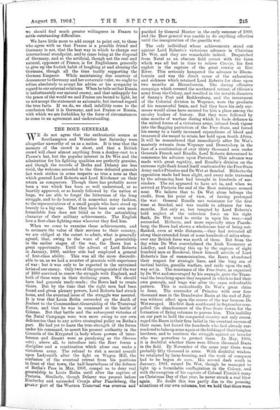TOPICS OF THE DAY.
FRANCE, GERMANY, AND ENGLAND.
THE "Colonist" who gives us the benefit of his views in the columns of the Daily Express is often somewhat truculent in tone and by no means always perfectly in- formed, but there is a good deal in his statement in Thursday's issue that Colonists, from the nature of their standpoint, often see things that we miss. He holds that this is true in regard to our foreign relations, and considers that we make far too much of Germany and too little of France, though in truth there are very strong reasons against our being able to come to a good understanding with Germany, and practically none against such an understanding with France. On the main contention, as our readers know, we entirely agree with " Colonist," but he is very much mistaken if he really thinks that the majority of the British people do not recognise this fact. Whatever may be the position taken up by our Government, there can be no sort of doubt as to the attitude of the people. The British people are most amicably inclined towards France on the one hand, and on the other realise fully that between Germany and Britain there are points of difference which it is almost impossible to get over. They understand that there is no reason why we should not be friends with France, but a great many reasons which militate against a friendship of an equally lasting kind with Germany. This does not, of course, mean that they want to go to war with Germany at once, or that they think war with her inevit- able, but merely that they recognise a community of interests with France which does not and cannot exist in the case of Germany. We do not, however, desire to dwell in detail upon the point whether " Colonist " is right or wrong in thinking that people here do not recognise that France, not Germany, is our potential friend in the European Concert. We will leave that question over, and content ourselves with pointing out the reasons which draw us and France together, and force us and Germany apart. In deciding whether two nations are capable of, and fitted for, political friendship and co- operation, the essential thing is to study the ambitions and aspirations of both. If those ambitions and aspirations clash and are antagonistic, then political friendship is not possible. If, on the other hand, they occupy different fields, and are moving on parallel and not on conflicting and opposing lines, there should be no bar to political friendship. Let us apply this test to the case first of Germany and then of France. Germany's aspiration is for a great oversea political and commercial Empire founded on sea-power. So is ours, or rather, ours is for the maintenance of the political and commercial Empire which we already possess. We have oversee. Colonies, and Germany wants them. We have sea-power ; Germany wants it. We have a world-wide trade and commerce ; Germany wants it. It happens, too, that Germany cannot satisfy these aspirations and have what she wants without taking them away from us. Why not, it may be said ? Why cannot Germany, for example, get these things from other Powers, civilised and barbarous, without interfering with us ? There is a plentiful field for German Imperial enterprise outside the British Empire. A little reflection will give the answer to these questions, and will show that if Germany is to satisfy her aspirations, it must be at our expense, because as matters are at present arranged aggrandisement at our expense is the line of least resistance, and along the line of least resistance nations, like individuals, are bound to move. Take the case of the colonies. Germany cannot acquire large oversea possessions at the expense of China for fear of Russia. Russia is dreaded by Germany with a dread that is hardly realisable here ; and Germany will do nothing whatever oversea, which might provoke a conflict with her terrible Eastern neighbour. So with France. Germany per se would greatly like to obtain a portion of Morocco, and to get access to sea-ports in the Levant and on the coast of Syria ; but as we saw recently in Morocco, Germany at once disclaims any sort of aspiration that in the least interferes with France. Germany wants colonies, but not at the risk of a conflict on the Rhine. It is the same with Spanish South America. Germany would like very much to get a lodgment on that continent, and especially affects the s nithern provinces of Brazil, where there is already a great German population. But she has been warned that the Monroe doctrine applies there, and that the price of colonial expansion in that direction is a war with the United States. There remains very little but the British Empire. Owing to our curious political infatuation for Germany, and our unwillingness to seem harsh or unfriendly in our dealings with her, our Colonial Empire is the line of least resistance. The history of Damaraland, of Zanzibar, of Samoa, of Kiao-chow, of the Yangtzse Agreement, of the " deals " between us and Germany and France in the Hinter- lands in West Africa,—all clearly show that we offer the line of least resistance. The only case in which Germany has dared to wound other susceptibilities than ours has been that of the Persian Gulf and Asia Minor, and there she has only done it, as it were, under cover of Britain. Unquestionably, as things now stand, German colonial aspirations will only be satisfied at our expense. It is the same with sea-power. No one seriously challenges our command of the sea except the Germans. The Germans realise that if they can get a Fleet only half as big as ours, and if at the same time they can keep us at loggerheads with France and Russia, they will have the moral, if not the physical, command of the sea. If when their Fleet is ready they threaten to join with France or Russia, or both, our position will be a most difficult one. The fact that German commercial aspirations conflict with ours needs no elaboration. Germany—and small blame to her, if we look at the matter from her point of view—wants the carrying trade, the shipbuilding trade, and also to be the great manufacturing country of the world. If she is enter- prising enough to achieve this, we cannot, of course, stop her ; but it is useless to contend that this aspiration does not conflict with our own most vital aspirations.
Now look at the case of France. France has got all the colonies she wants, and now that we have wisely refused to withstand France in Siam, or to interfere with her in South China or in North-West Africa, we have really no points of difference. The great African Empire of France, which stretches from Tunis to Lake Chad, is no more disputed by us than France now disputes our occupation of Egypt. Again, France gives us no challenge in East Africa. The splendid island-Empire of Madagascar is hers, but she makes it no ground for claiming to interfere on the South African mainland. It was Germany, not France, who made trouble for us during the South African blockade. In fact, France, like ourselves, has got all the colonies she wants, and is perfectly content with the status quo. It is the same with sea-power. France has always had, and means to have, a powerful Fleet, but she does not challenge the command of the sea, which she in effect recognises as naturally belonging to an island- State which cannot live unless the sea is open for her. French commerce, again, does not seriously compete with ours. Where it is most important it is least competitive. We are no more able to supply the world with wines than France is able to supply it with coal, iron, and cotton. It is true, no doubt, that there exists in Newfoundland a possible, nay, a very serious, source of friction between us and France. If, however, there could be a little give-and-take on both sides, this problem should find itself solved. We do not want to defraud France, but merely to stop a possible source of enmity. If France could be made to understand that we recognised that she was our natural friend and not our rival, she would doubtless be far more inclined to come to an agreement. As it is, she imagines that we are always the friend of Germany, always ready to yield the things demanded by Germany and never those asked for by her, and so naturally is not anxious to do us a good turn. If we makethings pleasant for England, it will beno good to us, for next day British statesmen will be visibly slaving away at dragging the triumphal car of Germany. Till we have some indication that England's infatuation for Germany is passing, and that she will not fall into every trap laid in Berlin to embroil her with our ally Russia, why should we help England ? At present to smooth Britain's path is simply to add more power to Germany's faithful and long- suffering drudge.' No doubt there is some exaggeration in a view thus expressed, but it pretty fairly expresses the view of many. Frenchmen. If, however, we could convince them that we had ceased to be the drudge of the Kaiser. we should find much greater willingness in France to settle outstanding difficulties.
We have little more to add except to point out, to those who agree with us that France is a possible friend and Germany is not, that the best way in which to change our international standpoint, and to cease being at the disposal of Germany, and so the artificial, though not the real and natural, opponent of France, is for Englishmen generally to give up the foolish habit of laughing at and abusing the Germans, though all the time tacitly supporting the German Emperor. While maintaining due courtesy of demeanour to Germany and her autocratic ruler, we ought to refuse absolutely to accept his advice or his sympathy in regard to our external relations. When he tells us that Russia is unfortunately our natural enemy, and that unhappily for the peace of the world we and France are bound to fight, let us not accept the statement as axiomatic, but instead regard the true facts. If we do, we shall infallibly come to the conclusion that it is Germany, and not France or Russia, with which we are forbidden by the force of circumstances to come to an agreement and understanding.







































 Previous page
Previous page